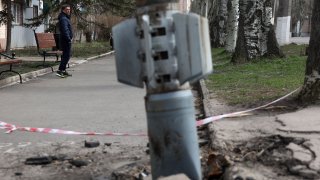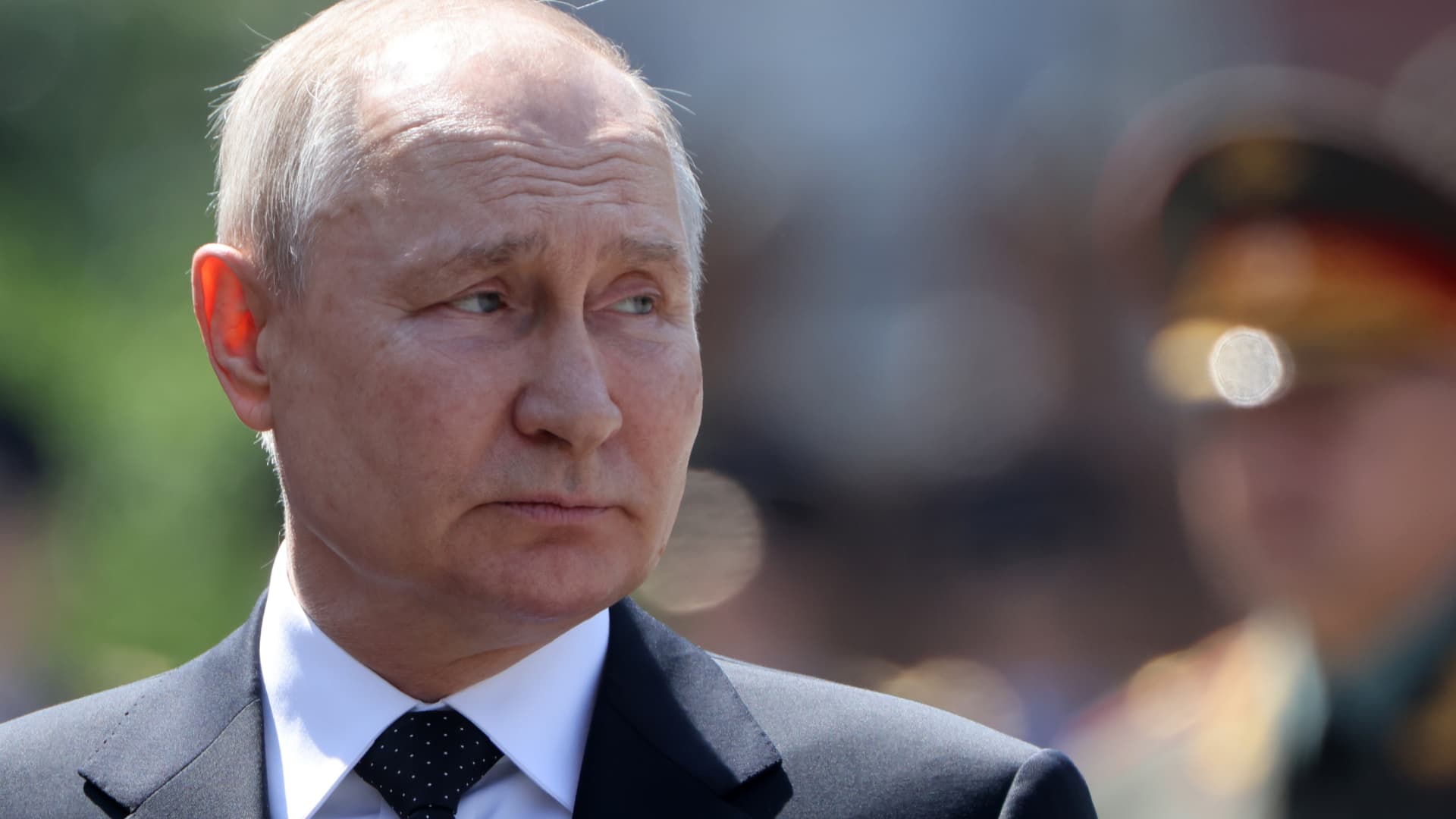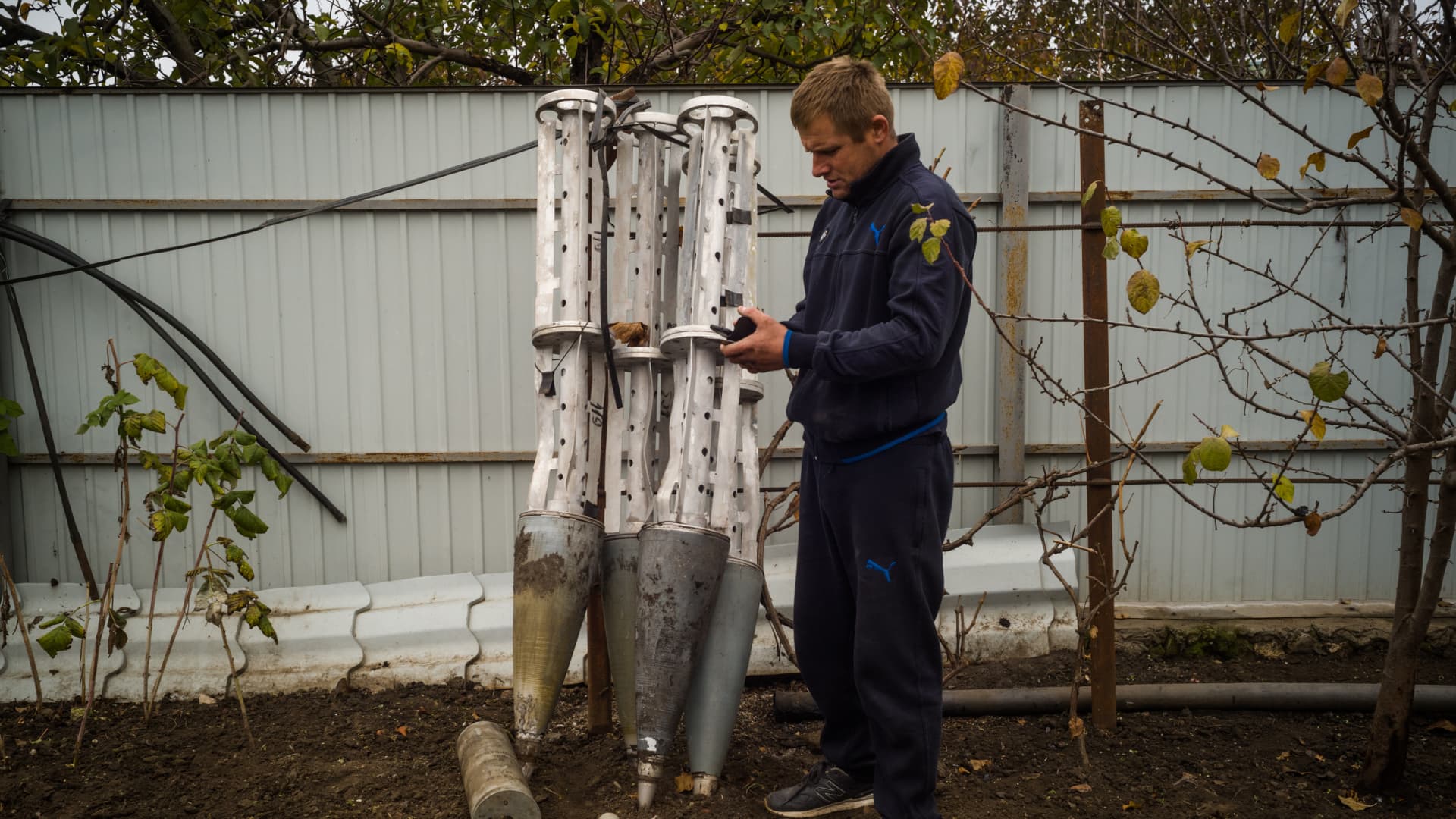
- Russian President Vladimir Putin warned on Sunday that Moscow has a "sufficient reserve" of its own cluster munitions and said Moscow reserves the right to use the controversial weapons for "tit-for-tat actions."
- Kyiv received a stockpile of cluster munitions — essentially, explosive weapons that are designed to release large numbers of smaller bomblets over a wide area — from the U.S. last week.
- Ukraine could use an increasing number of cluster bombs as its stockpiles of conventional shells run low and as it looks to gain the upper hand in its counteroffensive.

Russian President Vladimir Putin warned on Sunday that Moscow has a "sufficient reserve" of its own cluster munitions and said Moscow reserves the right to use the controversial weapons for "tit-for-tat actions."
Kyiv received a stockpile of cluster munitions, or cluster bombs — weapons containing multiple explosive submunitions, or bomblets, that are released over a wide area — from the U.S. last week, but Putin said Moscow is now ready to deploy the same weaponry against Ukraine.
"Russia has a sufficient reserve of various kinds of cluster munitions, various kinds. So far we have not done it, we have not used them, and we have not had such a need, despite a certain shortage in munitions at a certain point of time. But we didn't do this," Putin told the "Moscow. Kremlin. Putin" program on the Rossiya-1 TV channel, according to comments reported by Russian state news agency Tass.
"But of course, if they [cluster munitions] are used against us, we reserve the right to tit-for-tat actions," the president said.
He said the U.S. is supplying cluster munitions to Kyiv because of Ukraine's general shortage of shells, claiming "the Ukrainian army spends up to 5,000-6,000 155mm caliber shells per day of fighting, while the U.S. produces 15,000 a month."
"They have a shortage, and Europe already doesn't have enough [shells]," Putin said, adding "so, they didn't find anything better than to propose the use of cluster munitions."

The U.S.' decision to supply Ukraine with cluster munitions comes as Kyiv's stockpiles of conventional artillery shells run low, and as it looks to break through Russian defenses in its counteroffensive to retake Russian-occupied territory in the south and east of the country.
Feeling out of the loop? We'll catch you up on the Chicago news you need to know. Sign up for the weekly Chicago Catch-Up newsletter here.
Money Report
Still, the supply of such weapons is controversial.
Though not banned by the United States, Russia or Ukraine, cluster bombs are outlawed in over 100 countries under a global pact, the Convention on Cluster Munitions, because of the danger they pose to civilians. Children are seen to be at particular risk as the bomblets can fail to explode until they're later picked up, and are easily unseen and trodden on. Human rights groups condemn the weapons and have called for a complete ban on their use.
A number of Ukraine's international partners have balked at the U.S. decision to send cluster bombs to Kyiv, though both Russia and Ukraine are believed to have already deployed cluster munitions since the war started in February 2022, according to the U.N.-partnered Cluster Munition Monitor civil society group.
The United Nations called on the warring parties to immediately cease all use of cluster munitions. It has deplored their use, stating that "cluster munitions are not only dangerous in the short-term, but pose severe long-term risks to local communities." Up to 40% of cluster munitions fail to explode on impact, the U.N. said, which allows for "decades of intermittent detonations."
Unpalatable, but necessary?
Defense experts have argued that while the use of cluster bombs is unpalatable to a number of Ukraine's NATO allies and human rights groups, the uncomfortable truth is that there is an urgent need to maximize the efficiency of Ukrainian artillery fire and alleviate Ukrainian and wider NATO ammunition shortfalls.
They add that cluster munitions could be a critical factor in determining the outcome of the conflict.
That has become increasingly salient amid a flagging counteroffensive, with Ukraine's forces facing miles of Russian defensive fortifications that were built up in the months leading up to the counteroffensive, and while waiting for more military hardware from allies.
Read more
Russia's military has adapted and is now a more formidable enemy for Ukraine, defense analysts say
"Cluster munitions would be valuable in breaking through Russian trenches, while the threat to civilians is negligible amid Russia's mass emplacement of unmarked minefields," said defense analysts Jack Watling and Justin Bronk from the Royal United Services Institute (RUSI) think tank, in an analysis published last week.
"Ukraine is currently undertaking a major offensive, seeking to break through three successive lines of Russian defences to liberate occupied Ukrainian territory. To do this, the AFU [Armed Forces of Ukraine] must fight their way through over 30 kilometres of complex, unmarked minefields, across tank obstacles, and into extensive trench lines, covered by Russian UAVs, artillery and helicopters."
Progress in the counteroffensive is "critical to preventing Russia from indefinitely protracting the conflict," the analysts said, adding "therefore, there is a direct correlation between enabling Ukraine to succeed on the battlefield now, and creating the necessary preconditions for a viable peace."
To break the defense line, Watling and Bronk said, Ukrainian artillery is "critical for suppressing Russian indirect and direct fire, thereby enabling Ukrainian troops to assault Russian trenches." But, it added, Kyiv is fielding fewer artillery pieces than the Russian military and finite stocks of ammunition has become "a major constraint on how long Ukraine can maintain a high tempo of operations."
The U.S. is providing Ukraine with dual-purpose improved conventional munition (DPICM) rounds that are designed to be fired from 155 millimeter Howitzer cannons. Watling and Bronk said DPICMs for 155 mm howitzers and multiple launch rocket systems "greatly multiply the efficiency of artillery fire against entrenched troops."
While a conventional artillery shell has a very low probability of killing Russian troops unless it lands directly in a trench (and even if it does land in a trench, a high-explosive round will only spread shrapnel in the trench sector within the line of sight of the point of detonation, the analysts note) a DPICM round spreads 72 submunitions over a significant area, having a far more lethal impact.
Dangerous precedent?
The endorsement and supply of cluster bombs to Ukraine have raised concerns among a number of Ukraine's allies — the U.K., Canada, Spain and Germany voiced concerns over the move.
The White House said last week it had received written assurances from Ukraine that the munitions would not be used in civilian and urban areas and that records would be made of where they are used. Ukraine said it would also conduct demining operations after the war to mitigate any potential harm to civilians.
However, legal and security experts have said the very use of cluster munitions could undermine international humanitarian law.
"How a state conducts itself during a war is important. Irrespective of the aggression by Russia, and regardless of who has joined the Convention on Cluster Munitions, the rules of international humanitarian law must be respected by all parties to the armed conflict," Chatham House's Patricia Lewis and Rashmin Sagoo said in a note last week.
"These rules are designed to balance military necessity with humanitarian purpose – they seek to protect civilians and diminish unnecessary suffering. Ukraine is fighting not just for its territory but for the international rule of law; its own conduct of hostilities must comply with the rules of war," they noted, adding that "attention will now need to turn to scrutinizing how Ukraine deploys the U.S. weapons and whether it can live up to its assurances on how they will be used."
Addressing legal and ethical considerations when it comes to the use of cluster bombs, RUSI's experts noted that a significant proportion of other munitions also fail to explode, making cluster munitions no different.
In addition, they noted that Ukraine is looking to employ those weapons against Russian field fortifications in open countryside that are already surrounded by unmarked minefields and unexploded Russian ordinance — making the areas already highly dangerous for civilians in any case.






